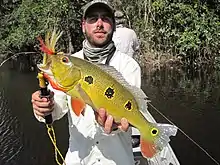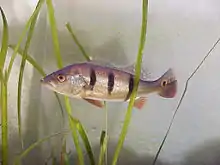Cichla orinocensis
Cichla orinocensis, sometimes known as the Orinoco peacock bass, is a very large species of cichlid. This peacock bass is native to the Rio Negro and Orinoco River basins in northern South America.[1] It mainly occurs in blackwater rivers.[2] Despite the name, it is not the only peacock bass in the Orinoco, as the river also is home to C. intermedia, C. nigromaculata, and C. temensis.[2] Where it overlaps with the last species, C. orinocensis prefers more slow-moving and shallow waters.[3] They are able to tolerate more turbid waters than other species of peacock bass.
| Cichla orinocensis | |
|---|---|
 | |
 | |
| Adult above, juvenile below | |
| Scientific classification | |
| Kingdom: | Animalia |
| Phylum: | Chordata |
| Class: | Actinopterygii |
| Order: | Cichliformes |
| Family: | Cichlidae |
| Genus: | Cichla |
| Species: | C. orinocensis |
| Binomial name | |
| Cichla orinocensis Humboldt, 1821 | |
It reaches up to about 62 cm (2 ft) in standard length.[1] Adults are easily recognized by the three large gold-edged dark spots on the side of their body (a fourth spot on the tail) and lack of dark markings on the operculum.[2][3]
A genetic study has indicated a clear divergence between the Orinoco and Rio Negro populations. If split, the Orinoco would retain the scientific name C. orinocensis.[4]
References
- Froese, Rainer and Pauly, Daniel, eds. (2017). "Cichla orinocensis" in FishBase. October 2017 version.
- Kullander, Sven; Efrem Ferreira (2006). "A review of the South American cichlid genus Cichla, with descriptions of nine new species (Teleostei: Cichlidae)". Ichthyological Explorations of Freshwaters. 17 (4).
- "'Borboleto'—Cichla orinocensis". Acute Angling. Retrieved 17 October 2017.
- Willis; Nunes; Montaña; Farias; and Lovejoy (2007). "Systematics, biogeography, and evolution of the Neotropical peacock basses Cichla (Perciformes: Cichlidae)". Molecular Phylogenetics and Evolution. 44: 291–307. doi:10.1016/j.ympev.2006.12.014. PMID 17275345.CS1 maint: uses authors parameter (link)
| Wikimedia Commons has media related to Cichla orinocensis. |